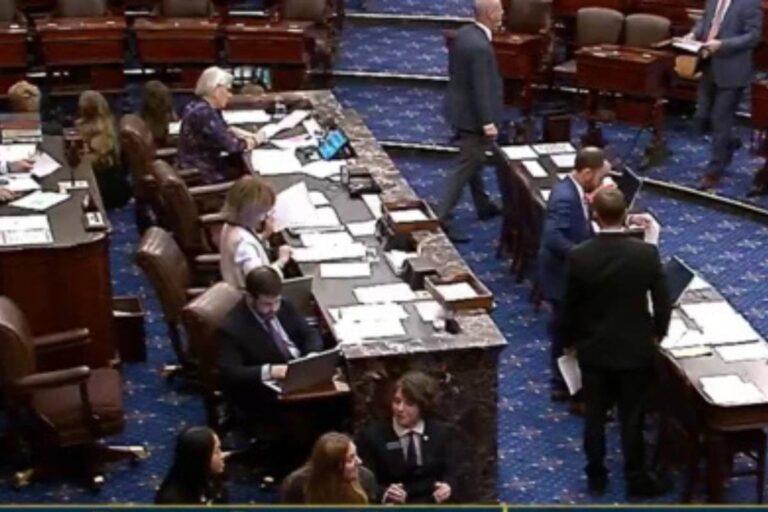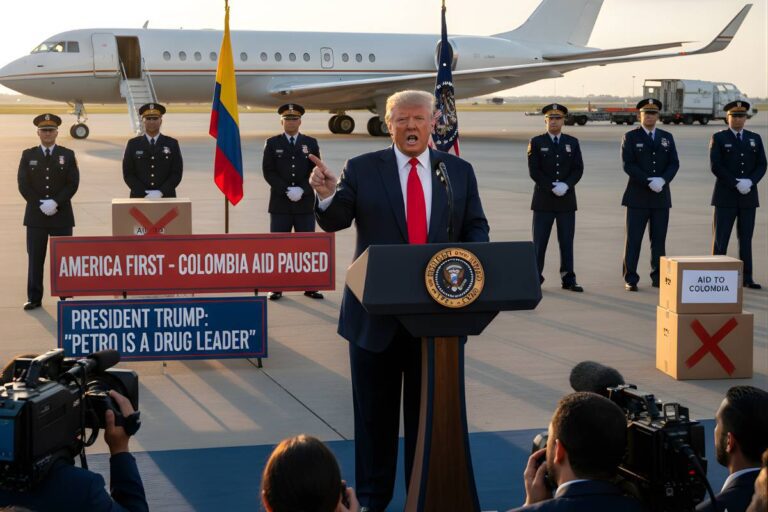UNSC Holds Closed-Door Session at Pakistan’s Request
The United Nations Security Council (UNSC) held a closed session on Monday, May 5, 2025, at the request of Pakistan to discuss the rising tensions with India after a recent terror attack in Pahalgam. But the session ended without an official statement or decision, and reports suggest that Pakistan was confronted with tough questions from member states and was unable to obtain the international intervention it was looking for. This result is generally seen as yet another diplomatic failure for the Islamic country.
The UNSC session took place against the backdrop of extremely escalated tensions between India and Pakistan, which were mainly triggered by the fatal terror attack on April 22 in Pahalgam, Jammu and Kashmir.
India’s Strong Response to the Pahalgam Attack
The attack killed 26 people, mostly tourists. India reacted forcefully to this act of aggression, with Prime Minister Narendra Modi promising to pursue relentlessly and bring to justice the perpetrators of the attack. In the wake of the attack, India is said to have imposed several punitive actions against Pakistan. These actions included suspending the Indus Waters Treaty, suspending visa services for Pakistani citizens, and shutting its airspace to Pakistani planes. The attack on Pahalgam was claimed by The Resistance Front (TRF), a group that India accuses of being a front for Lashkar-e-Taiba (LeT), a UN-sanctioned terrorist outfit. The fact that the request was made by Pakistan soon after India had issued its stern response and determined that there was a Pakistani-aligned group that bore responsibility for the attack may represent an Islamabad move to anticipate new actions on the part of New Delhi or solicit global criticism against India’s action. The presence of LeT, a UN-listed terrorist group reportedly located in Pakistan, is an important consideration that likely detracted from Pakistan’s ability to rally international sympathy or support.
Pakistan’s Strategic Appeal and Its Limitations
The UNSC closed-door consultations were conducted in a consultation room located next to the main UNSC Chamber in New York. Pakistan, which is currently a non-permanent member of the 15-member Security Council, officially requested these consultations.
Greece, which presides in the Council for May, then organized the meeting. During the meeting, Assistant Secretary-General Mohamed Khaled Khiari gave the Council members a briefing, giving them an overview of the situation at hand. While Pakistan’s position on the UNSC provided it with the leverage to call for this meeting, the failure to issue any official statement or resolution after the consultations would mean that this forum alone was not enough to get what it wanted diplomatically. That the Assistant Secretary-General had to brief the Council means that the UNSC was aware of the seriousness of the situation, even if they did not pass a formal statement afterwards. This briefing must have given member states an unbiased assessment of the tensions, perhaps modifying their own opinions outside the immediate appeal from Pakistan.
UNSC Members Question Pakistan’s Narrative
Information that emerged after the closed meeting reveals that the members of the UNSC held Pakistan to “tough questions”. A leading issue raised by various members supposedly was about possible involvement by the Lashkar-e-Taiba (LeT) in the Pahalgam terror strike. Moreover, some members expressed their concern over reports that the victims of the attack could have been targeted deliberately based on their religious affiliation.
Concerns Over Pakistan’s Conduct and Regional Stability
Pakistan’s recent behavior, such as missile tests and public nuclear threats, was also reportedly considered by many UNSC members to be escalatory and counterproductive to regional stability. In addition, it is said that Pakistan was counselled by a few members to engage in bilateral talks with India to settle the issues between the two countries. The story supposedly offered by Pakistan, trying to depict the attack on Pahalgam as a “false flag” attack, was allegedly dismissed and ridiculed by some UNSC members.
World Skepticism and Call for Bilateral Dialogue
The intense emphasis on LeT, an organization with suspected Pakistan connections, and the seeming dismissal of the “false flag” theory strongly indicate that the world community has skepticism regarding Pakistan’s assertions and is likely to ascribe the increased tensions, at least in some measure, to terrorism emanating from Pakistan. The complaints leveled at Pakistan’s nuclear announcements and missile tests highlight the general international unease over the potential for nuclear neighbors to go down a slippery slope of escalating their conflict, overwhelming any particular issue Pakistan would have wished to emphasize. The counsel to Pakistan to enter into bilateral negotiations with India mirrors the long-standing international view that the Kashmir question is essentially an issue to be settled between the two nations directly, with outside interference usually not preferred.
Pakistan’s Claim of Diplomatic Achievement
Counsel is consistent with India’s longstanding position and suggests that there is no desire within the UNSC to back Pakistan’s attempt to internationalize the matter. Despite the reports of being confronted with hard questions and the lack of any formal UNSC statement, Pakistan’s Permanent Representative to the UN, Asim Iftikhar Ahmad, claimed that the nation’s goals in calling for the meeting were “largely served and achieved”. He said the meeting had opened up a platform for UNSC members to exchange views on the worsening security situation and the escalating tensions between Pakistan and India, and how they could be prevented from further growing. In the course of the consultations, Pakistan also reportedly complained of India suspending the Indus Waters Treaty. Ahmad reaffirmed the commitment of Pakistan to friendly and cooperative relations with all its neighbors, India included, and asserted the country’s willingness to proceed based on mutual respect and sovereign equality in a dialogue of peace.
India’s Dismissal of Pakistan’s UNSC Move
Pakistan’s assertion of success in attaining its goals, in the absence of a concrete product such as a UNSC statement, might be seen as a move to create an impression of diplomatic triumph within the country, even though the global reaction was not as it had hoped. Bringing up the issue of the Indus Waters Treaty could have been a tactical decision by Pakistan to widen the scope of the debate beyond the immediate response to the terror attack and to bring up other areas of disagreement with India, where Pakistan may feel it has a better case.
India’s previous Permanent Representative to the UN, Syed Akbaruddin, had also expected that the UNSC meeting would not produce any “consequential outcome”. After the consultations ended, India released a statement claiming that “Pakistan’s grandstanding has flopped again today as in the past”. India feels that its diplomatic action has effectively pushed back against Pakistan’s efforts to engage the Security Council on the issue. India perceives such talks started by Pakistan as being essentially designed to mold global opinions and not really seeking a solution to the core issues, and hence does not anticipate any substantial outcome from them.
India’s negative response reflects its faith in solving the issue bilaterally with Pakistan and is indicative of its long-established resistance to third-party mediation in issues it believes fall within its domain of sovereignty.
UN and Global Reactions to Rising Tensions
The deployment of the word “grandstanding” by India is a reflection of India’s view that Pakistan’s real motive in requesting the UNSC meeting was to try and paint India in a negative light at the international level, as opposed to a sincere attempt at reducing the tensions or negotiating a peaceful solution. This is reflective of the entrenched distrust and hostility that define the two nations’ relationship, where both suspect and distrust each other’s actions.
Before the UNSC session, UN Secretary-General António Guterres had also spoken of his deep concern regarding the growing tensions between India and Pakistan, terming the situation as having reached a “boiling point”. He strongly condemned the Pahalgam terror attack as “awful” and reiterated the basic principle that the targeting of civilians is completely unacceptable. Guterres urged India and Pakistan to exercise maximum restraint and take immediate action to de-escalate the situation, stepping back from the brink of possible military confrontation.
Additionally, he extended the good offices of the United Nations to both administrations and articulated the UN’s willingness to facilitate any endeavor that works toward de-escalation, diplomacy, and renewed commitment to peace. The forceful condemnation by the UN Secretary-General of the terror attack mirrors the outcry from various UNSC members and implicitly puts pressure on Pakistan to address the menace of terrorism that seems to emanate from within its borders. His appeal for restraint by both sides, though ostensibly impartial, implicitly admits the high possibility of additional escalation in the area and emphasizes the international community’s keen interest in avoiding any military confrontation between the two nuclear powers.
Cautious Optimism from UNSC Members
The incumbent President of the Security Council in May, Evangelos Sekeris of Greece, described the behind-the-scenes session as “productive” and “helpful” in the context of de-escalation measures. Likewise, Russia’s Deputy Permanent Representative, Anna Evstigneeva, expressed her hope that there would be a de-escalation of tensions between India and Pakistan.
Congress MP Shashi Tharoor, a former Indian diplomat who has had much experience at the UN, commented on the meeting, saying that Pakistan was confronted with tough questions about terrorism and LeT involvement. Going by unofficial briefings, Tharoor suggested that the result of the meeting must have been less favorable to Pakistan than they expected. He also pointed out the geopolitical fact that China, which is a permanent member of the UNSC, would veto any resolution that condemned Pakistan.
Although the UNSC President and Russian delegate made positive comments about the potential of the meeting to contribute towards the de-escalation process, these were circumlocutory and did not reflect any tangible results or outright endorsement of Pakistan’s agenda.
This is an indication of diplomatic prudence, demonstrating recognition of the gravity of the situation while not committing itself to a clear position or condoning Pakistan’s version
Geopolitical Complications and Lack of Consensus
Shashi Tharoor’s commentary, based on unofficial sources, offers a more critical evaluation of the meeting from Pakistan’s side, pointing to the high level of scrutiny of the issue of terrorism and the seeming lack of international support for their stance. His reference to China’s possible role in vetoing any negative resolution against Pakistan highlights the complicated geopolitical dynamics that tend to affect decisions at the UN. The UNSC session highlights the ongoing global interest in the sensitive and frequently unstable relationship between India and Pakistan, especially in the aftermath of the horrific terror attack in Pahalgam.
Pakistan’s attempt to internationalize the matter and possibly rally support against India seems to have been unsuccessful to a large extent. Member states of the UNSC appeared more interested in the crucial matter of terrorism and the necessity for India and Pakistan to talk directly to each other bilaterally to address their differences. The failure of any official statement or resolution by the UNSC after the consultations implies either disagreement among the members or a desire to let India and Pakistan handle the situation through their diplomatic efforts. The UNSC members’ reports inquiring about Pakistan’s possible role in involving Lashkar-e-Taiba and its recent inciting nuclear belligerence reflect a possible change in global perception, with increased focus on Pakistan’s role in perpetuating regional instability.
Pakistan’s diplomatic failure at the UNSC would likely give India even greater confidence to pursue an even more aggressive approach in its relations with Pakistan, as it can be reasonably certain that the international community has very limited backing for Pakistan’s cause within this influential global forum. The international community’s consistent call over the years for India-Pakistan bilateral dialogue takes on added importance against this backdrop. It implies a dominant perception that unilateral diplomacy between the two countries is the most realistic route to de-escalation and the peaceful resolution of their intricate and age-old conflicts.
Conclusion: Diplomatic Deadlock and Emphasis on Bilateralism
Finally, the UNSC meeting held behind closed doors to address the rising tensions between India and Pakistan ended without a meaningful breakthrough or public announcement. This result marks yet another instance where Pakistan’s efforts to draw international intervention on the issue of Kashmir have failed to deliver. Although Pakistan’s representative argued that the country’s goals were met to a great extent, reports suggest that Pakistan was subjected to stern questioning by UNSC members on terrorism and its aggressive rhetoric. The international community, while concerned about the escalating tensions in the region, seems to prefer direct bilateral talks between Pakistan and India as the preferred course of action, leaving the two nuclear neighbors to work out their complicated relationship under heightened international scrutiny.






















